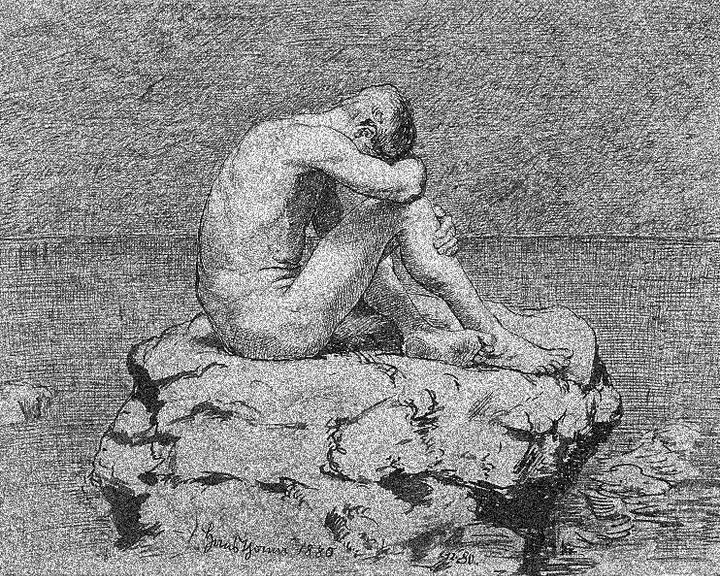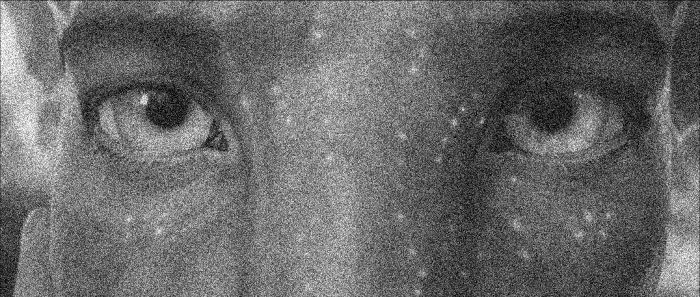Behind Our Backs, Part Three
Moishe Postone on theorists of culture and society.

See Part Two of “Behind Our Backs” here.
Durkheim, Lévi-Strauss, Foucault: The Winter Quarter (Culture)
MP
For me, the second quarter has to do with historical change in culture. In a way, Durkheim lays the ground for it in socially grounding the Kantian categories, doing the social turn. What he does with history is unsatisfying, but it opens up the possibility. The more rigorous cultural work coming out of Durkheim took the ahistorical direction: that’s Lévi-Strauss, everything based on Saussure. The logic is synchrony, diachrony is contingent. So how do you get historical change? Sahlins tries it with a contingent event: Captain Cook. That’s a wonderful analysis. It’s a wonderful little book. [Chuckling] I didn’t mean that! It’s a slim volume. When I was working on my dissertation in Frankfurt, one way of making money periodically was working at this giant book fair. It’s huge. The publisher for whom I worked was an American, and he said, “You know the joke making the rounds at the Frankfurter Bookmesse? What is the slimmest volume in the Frankfurt book fair? A Thousand Years of German Humor”—They’re good at many things, but humor’s not one of them.
At any rate, with Sahlins, it becomes contingent, and change comes from the outside. With Foucault, he doesn’t want to give up the idea of contingency, but it’s clearly an internal transformation. Nothing happens to Europe from the outside. It’s not like the Huns invade, and suddenly the ancien régime collapses. That reintroduces the idea of history as internal transformation. And from there I think you can go to Adorno and Benjamin, who are much better in terms of their understanding of history. For Foucault, historical change is contingent, but in every one of his books, things break at the same time. Whether you’re talking about prisons or asylums, it’s always that way.
But there are parts of the analysis that I think are wonderful. He gives you the break, but he also gives you the reformers, who are disgusted with the arbitrariness of the ancien régime, both the mob and the king. He makes the point, which some people don’t seem to get, that the reformers don’t really win. What wins out is actually something that existed all along under the ancien régime, but in a subterraneous way, and that’s the disciplines. The disciplines are the mole digging under the surface, and then once the ancien régime collapses, it emerges.
JC
So it’s a cunning of history argument?
MP
In spite of himself. If you notice, after the reformers he goes right back to the beginning of the 17th century, with the contrast that he draws between the Renaissance warrior and the soldier. The Renaissance warrior is an artist of himself. He is self-created. The soldier is a cog. We’ve all seen the movies where the British know when to kneel, when to stand up, when to fire, when to load. That’s a machine. And he’s very good on that.
BF
Let me try to spell out the logic of the quarter more slowly: you start with Durkheim because our categories are now social. Lévi-Strauss goes in the wrong direction…
MP
But it’s a very rigorous look at the categories of thought. But it’s completely non-historical. Once you’ve got Lévi-Strauss, what do you do with history?
JC
Why do you think history disappears in Lévi-Strauss?
MP
It’s explicit. The logic is synchrony. This is Saussurian linguistics. Change happens because systems adapt to contingent events. So synchrony is to system as diachrony is to event. At least as I understand it.
BF
What value then do you see in teaching Lévi-Strauss after Durkheim? Despite the rigor, he goes in a very different direction than everyone else.
MP
For me, there is an attempt to show that the cultural forms are not just random. Change might be contingent, but they are in a systemic relation to one another. Foucault suggests that, but he doesn’t really work it out. Benjamin and Adorno do work it out within a completely different paradigm.
JC
You’re saying Lévi-Strauss has a concept of totality that isn’t a historical totality…
MP
But is definitely a totality, yes. The meaning of anything only has its meaning in reference to the whole system. When the course was more influenced by anthropologists, we tried different approaches, Victor Turner, for instance. He posited almost a one-to-one relation: this color, this meaning. Lévi-Strauss was of course completely against that.
I didn’t like Turner because of another reason. I hadn’t realized it at first, but his informants were largely miners. Not minors. Miners. It’s a third world proletariat holding on to traditional forms. It would have been really interesting if he had introduced that, because then the question is: how are these forms that he describes, how can they be understood as part of this attempt to work out a complete break with tradition, and a new situation which has nothing to do with tradition? How are they making sense of their world, and how do we make sense of these various rituals with reference to the world? But Turner says, “I’m an anthropologist, and since I’m going to discover the authentically cultural, I’m going to bracket the fact that they’re copper miners (or gold miners, I forget which one it was). I’m going to bracket that to get at culture.” A) It’s Romantic, in the bad sense of the word, which a lot of anthropology used to be, and probably still is. And B) His analysis is inadequate to the object of investigation. Precisely what’s most interesting is bracketed. I don’t want to read a book where I have to correct everything.
JC
So, Durkheim equates pre-modern, or even pre-civilizational, religious forms with contemporary religion, defining out of existence this idea of religion as a system of beliefs…
MP
A brilliant move.
JC
It is.
MP
So smart. It changes the entire discourse.
JC
But I’m curious, earlier you seemed to think of Durkheim as a fundamentally historical thinker, but that seems in a way a kind of challenge to history.
MP
No, no, I think he’s got a very weak sense of history. It’s not worked out. But it is a social theory of religion, a social theory of the Kantian categories. It’s possible to give students a teensy bit of Kant here: there’s no access to the world as it is, it’s always mediated by the categories, the only way in which we can make sense of the various forms of sensory input is because we have these boxes that can order them, and the boxes are in the structure of the mind. For Durkheim, he accepts all of this, except that the boxes for him are social.
BF
Regarding Durkheim’s “weak sense of history,” I assume you were referring to the conclusion where he talks about moral mediocrity.
MP
How do you move to the level of abstraction that governs modern times [for Durkheim]? As societies get bigger, there’s a sinking down to a common denominator of what had been local beliefs. And that means it’s a process of abstraction that is rooted spatially in society’s getting bigger. There’s a linearity that I don’t agree with.
BF
That does seem to allow in one thing that I think is important in the work, which is that he’s able to account for his own position.
MP
Yes, and Lévi-Strauss can’t do that, and Foucault can’t do that. The one thing anthropologists hate about Durkheim is what I like about him. The anthropologists hate this kind of evolutionary theory, but in his framework, the evolutionary theory justifies the statement at the beginning of the book that the scientist can see further than the native.
JC
What do you make of the fact that the famous passages about collective effervescence are in the same book as a statement about the origin of the Kantian categories? And that there seems to be for him some tie there?
MP
Well…, no, it can’t be true. What I was going to say is that I don’t think he possibly imagines that in the late 19th or 20th century, collective effervescence is barbarism. That’s what I was about to say. And then it occurred to me: ah, he lived through Dreyfus. There was a lot of collective effervescence out on the street. There were essentially storm troopers on the street. So he knows it. Is he in denial because he’s such a good French Republican?
BF
We talked before about the dissolution of the self, and I think that the students often latch on to Foucault as the most radical of the theorists who would say that the self is nothing but the product of its construction. Could you speak to Foucault’s place in the winter quarter?
MP
In a funny way, I think that we use Foucault against his intention. To read Discipline and Punish is not really a good introduction to Foucault. In some sense, we’re providing an introduction to Freud, to Marx, but not Foucault.
Personally, I don’t think as highly of Foucault as most people do. I think there are too many things in his work the implications of which are not thought through. I basically think of Foucault as an attempt to historicize culture and the constitution of the self. But his historicization is too Cartesian for me.
JC
How so?
MP
The debate between Cartesianism and Newtonianism is that for Descartes, everything had to touch everything else. With Newton, there’s action at a distance. Similarly, for Foucault, everything is always touching everything else. You have people deciding on the disciplines, and the disciplines are molding the people. There are breaks, but they’re unmotivated. It’s brilliant description… I guess by my language I’m already giving away what I think. My question is: why are the disciplines suddenly a plausible way of organizing things? For control, sure, but there’s been social control before. It didn’t have that form. Why does it take on that form? It doesn’t begin, in his own account, in one place and then diffuse outward. But it begins roughly in the same historical period, in Hamburg, in Amsterdam, in Paris, England, then Philadelphia… what’s going on? Who’s educating the educators?
It’s pretty easy to tie it to a kind of Marxian tradition, but that’s not Foucauldianism. The way in which he introduces capitalism is, I think, beside the point because it doesn’t occur to me that the mode of rationalization he describes itself has to do with capitalism. In Foucault, you’ve got property, you’ve got these warehouses, so the question of the relation of crime to society changes. They’re not invalid points. But the idea that operating everything according to an increasingly mathematical metric, that that has a great deal to do with capitalism as a quantitative form, isn’t there.
I think it’s clear from everything I’ve said that I don’t think Foucault is so radical. Why is he so radical?
BF
Radical in the sense that there is no reality there apart from the discipline that makes it. So when you get to Adorno, there’s an individual there, but for Foucault, all that individuality is is an effect of discipline.
MP
Except that for Adorno, the individual that is under attack is itself historically-constituted. The problem for Foucault in this regard, which I’m afraid is true of a lot of French thought, is that there’s no reflexivity. What is the standpoint from which you say the individual doesn’t exist? What writer is saying this? One from outer space? What are the conditions of possibility of Foucault’s own knowledge? Without that reflexivity, for me, he’s not radical.
BF
So you start with Durkheim—the categories are social, but he can’t think history—and then Lévi-Strauss goes in the wrong way, Sahlins and Foucault try to introduce contingency, and it’s only Adorno and Benjamin that really figure it out. It’s interesting to think of the Frankfurt School as completing a project envisioned by Durkheim.
MP
That’s the way I teach it, but the Frankfurt School tradition is quite different, imbued deeply with Hegel and Marx, not just Kant. Of the big three, two are missing from the French tradition. I know Kojève does Hegel, and everyone talks Marx, but it’s surface level.
Weber: The Fall Quarter (Society)
BF
The one author we were hoping to have you say something about from the first quarter is Weber. From Smith to Marx, the transition is obvious. But Weber seems just as essential here.
MP
Weber is one of the most important social theorists of the late 19th and 20th centuries, certainly alongside Durkheim. Some people put him higher, some lower. A lot of his thought for most undergraduates is deadly. He’s a legal theorist. It’s boring. It’s these catalogues of things, technologies, and your eyes glaze over.
JC
Lots of lists.
MP
Lots of lists. But Weber’s notion of the cultural consequences of Puritanism: the pilgrim fathers, the idea that sports are good, anything else having to do with the body is bad. Reading this, students begin to recognize aspects of their world. I find it very useful. It’s also pretty easy to go from there to a brief discussion of the notion of masculinity: men don’t cry, men don’t show emotions. A lot of kids think gender, period. This is what masculinity is.
JC
Traditionally, Weber is thought of as post-Marx, Marx and Weber being in two different traditions.
MP
No. The first German academic to introduce Marx into the academy was Weber. Sure doesn’t sound like the Weber of Parsons. Weber’s a post-Marxist in that he’s for social democracy, but unlike a lot of liberals, he’s deeply concerned with capitalism. And his notion of what capitalism is is taken straight from Marx: the pursuit of ever-renewed profit. It’s not private property, it’s not the market, it’s not free enterprise. And that helps him set up this idea that your life becomes subservient to a process that has no end.
BF
What then does Weber add to Marx?
MP
I think it adds a dimension to their understanding, just as when you read E.P. Thompson. When you read theory, you should know a lot of history, so that as you’re reading the theory, the history is in the back of your mind, organizing your reading. One of the big fights I have with the Habermasians, many of whom are my friends, is that they mistake Habermas for a historian. They’re all philosophers, and clueless about history. They think that his schemata are actually historical, that he was doing history.
JC
Earlier, when you were schematizing the three quarters, you said that the third quarter is about the way in which society constitutes the self, the second quarter is about the constitution of systems of meaning that come to constitute us, and the first quarter is about the constitution of society. Is political economy—or the concept of capitalism—a way of understanding the constitution of society?
MP
We start with political economy because it structures things. It’s a massive transformation. Unlike some of my friends, I don’t think culture has its own historical logic. Economy doesn’t either. Capitalism does.
JC
So society itself is a concept of capitalism.
MP
Yes. I think Adorno actually wrote that. Here I agree with him. You don’t have people using the word society, maybe other than “high society,” until you have capitalism. It doesn’t mean anything. For me the transitional figure is Rousseau because Rousseau is trying to deal with levels of social being that escape the grasp of political philosophy, but he’s using the language of political philosophy to try to grapple with it. In that sense, he’s a very early social theorist. But his language is the language of political philosophy. Maybe one day, when I live to be 120, I’ll write a book on this. He’s not the only writer who uses a vocabulary to try to grasp something that frequently escapes that vocabulary because it is rooted in an earlier paradigm that the writer is helping already to change, conceptually.
BF
But you think social science really begins with Smith.
MP
It’s Smith who first begins to give you an anatomy of society with his categories that Rousseau doesn’t give you. The idea that capitalist modernity has a kind of structure that Smith called the division of labor: so incisive. And then you have categories that help understand why the division of labor looks the way it does. Structures and categories that are operative behind the backs of the actors. This is the important stuff.
BF
If you had to characterize the beginning of social science, it would be the discovery of that which works behind our backs?
MP
Yes, that which is created by humans behind their own backs in a non-random fashion.
JC
As a form of compulsion?
MP
Frequently it’s a form of compulsion. Certainly in capitalism it’s a form of compulsion.
BF
This is perhaps where the psychoanalytic idea of drive might fit.
MP
Yeah, very much so. I’ve got so many books I want to read that I probably won’t have time to read. I finally found online a very nice edition of Freud’s complete works in German. And I thought I could work my way through them. And I probably won’t.
JC
Do you think certain authors resonate with the students more than others?
MP
I don’t think it can be separated from the people teaching them. Years ago I was very good friends with a woman in the anthropology department, and every year, she said, the theorist they love the most is Lévi-Strauss. It’s clearly coming from her! Whereas if you’ve got a whole staff who can’t stand Lévi-Strauss, the students won’t like him either. My students love Marx. There are so many subtle hints that take place. It is a transferential situation. Today, we’re either pretending sexuality doesn’t exist or talking about it in terms of harassment. It behooves a teacher to be aware of erotic transference in the classroom. A lot of teachers, before psychoanalysis, used to take it as a statement about them, that they were just so sexually desirable. So you have to be aware of it, and then you deal with it, to use it in good ways. That then carries over to the way in which different authors are cathected for different teachers, that becomes part of the whole mix. So students can pick up on that, even if they don’t know they’re picking up on it, and even if you don’t push one or two authors.
I try very hard not to trash anyone. You’re trying to get them to take authors seriously, not to say, “they’re good, they’re not good.” So much of their thinking is now so narrow. A good friend of mine who’s kind of a maverick feminist and essayist, Laura Kipnis, just got sued at Northwestern under Title IX. She’s not gonna back down. She’s used to offending people, and she’ll continue to do so. Some people think it’s okay to shoot others down if they disagree with their views, if they think they’ve got the truth. There was a time in my lifetime when this was thought of as fascist. This shouting down.
BF
Just today, I encountered the flip side of that problem: we’re reading Jonathan Metzl’s Protest Psychosis, and the central problem is that on the one hand, schizophrenia is a political construction, and on the other hand, it’s a real disease. So is it a matter of labels, or is it social structure getting under our skin? And someone after class came up to me and asked, “So which is it? What’s the right answer?” The students often want the truth rather than a difficult conversation.
MP
But the answer isn’t that the truth is always ambiguous but that we’re giving them arguments, not truths. And sometimes arguments are very difficult. It’s a difficult problem. I wouldn’t have a fast answer in my hip pocket to that problem of schizophrenia.
JC
One last question: there’s some worry about the future of the course. What do you think will happen?
MP
Well, I don’t know because I’m going to go on half-time. This course was historically kept up by a cohort of departmental faculty. These were people who not only taught and were good citizens, but were actively involved with the course. Either they pass away like Bert Cohler. Or they retire like Bill Sewell, Ralph Austen, JZ Smith, John Lucy. There wer– 6–7 departmental faculty that were the real cohort of the core, and now they’re gone. Many of the departmental faculty today are no different than their positivist cousins: they’re very narrow, and don’t want to teach outside of their comfort zone. And so I’m worried about the Soc Core because I don’t see people willing to jump in. They would have to be broad-gauged people who are committed to the idea of general education for undergraduates.
BF
And if that doesn’t happen?
MP
I don’t know.
■
Moishe Postone was Thomas E. Donnelley Professor of the College, History, and the Center for Jewish Studies at the University of Chicago and the author of Time, Labor, and Social Domination.
Jeremy Cohan is a PhD candidate in Sociology at New York University.
Benjamin Y. Fong teaches at Arizona State University.



